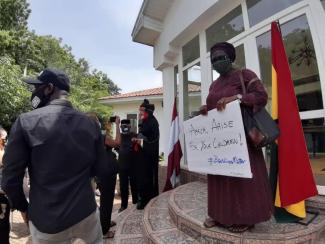
Kwasi Asiedu, Photographer
by MARGO NATALIE CRAWFORD, Director of the Center for Africana Studies, Professor of English, and the Edmund J. and Louise W. Kahn Professor for Faculty Excellence
When tragedies such as the brutal police murders of George Floyd, Breonna Taylor, and Ahmaud Arbery occur, the mission of Global Black Studies emerges with full force and unapologetic clarity. The Black Lives Matter Movement’s mission includes the desire to “work vigorously for freedom and justice for Black people and, by extension, all people.” This vigorous work for freedom and justice is the work of Global Black Studies. The work we do as scholars, teachers, and cultural workers insists upon what scholar Kevin Quashie hails as “black aliveness.” In the midst of the transnational protest against the white supremacist forces that keep killing black people, Global Black Studies insists on black aliveness. The Black freedom struggle has a long history of breaking the boundaries between the struggle in the street and black critical thought. Black Study makes theory and practice inseparable.
A photograph of a Black Lives Matter protest, in Accra, Ghana, of the murder of George Floyd crystallizes the power of Global Black Studies and the power of black aliveness. In this photograph, we see what is at stake when black people throughout the diaspora create a kinship through rising up in defiance of the forces of global white supremacy. The woman in the photograph holds a sign that reads, “Africa, Arise for Your Children!” #BlackLivesMatter.”
With the same urgency, Gwendolyn Brooks, in her poem “Riot,” writes, “In seas. In windsweep. They were black and loud./ And not detainable. And not discreet.” The loud, “not discreet” protest that is happening now in cities and towns in the United States and throughout the African diaspora should make us pause and feel a renewed, recharged sense of the mission of Global Black Studies at Penn and throughout the world.
The ferocity, passion, and rigor of Black Studies must continue to do what Toni Cade Bambara described as making revolution irresistible. The urgency of Black Studies must continue to hold on to Toni Morrison’s call for an unapologetic love of our flesh. Morrison’s words in Beloved echo as we rage against the killing of George Floyd: “And O my people, out yonder, hear me, they do not love your neck unnoosed and straight. So love your neck; put a hand on it, grace it, stroke it and hold it up. And all your inside parts that they'd just as soon slop for hogs, you got to love them. The dark, dark liver--love it, love it and the beat and beating heart, love that too. More than eyes or feet. More than lungs that have yet to draw free air. More than your life-holding womb and your life-giving private parts, hear me now, love your heart. For this is the prize.”
